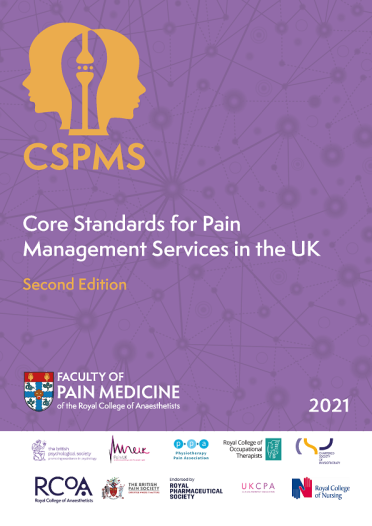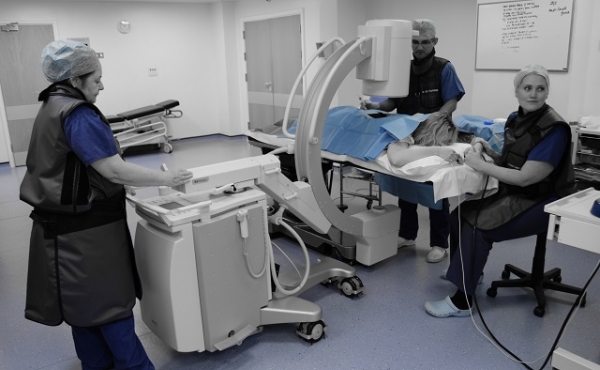Core Standards
Core Standards for Pain Management Services in the UK
Core Standards for Pain Management Services was updated by the Faculty of Pain Medicine in 2021. The Faculty worked with all major stakeholders across the Pain Management spectrum and a full list of endorsing organisations is contained within the document.
CSPMS: The Definitive Reference
Core Standards for Pain Management Services (CSPMS) is a collaborative multidisciplinary publication providing a robust reference source for the planning and delivery of Pain Management Services in the United Kingdom. It is designed to provide a framework for standard setting in the provision of Pain Management Services for Healthcare professionals, commissioners and other stakeholders to optimise the care of our patients.
Structure
CSPMS is broken down into chapters and sections which are clear and concise. After Chapter Two, each has the standard format of Introductions, Recommendations, Standards, Background and References.
Advice statements are made in CSPMS in two ways:
- Standards must be routine practice in UK Pain Management
- Recommendations should be routine practice in UK Pain Management
Commissioning and quality
Many specialist pain clinicians and NHS managers are involved presently in discussion with local Clinical Commissioning Groups (CCG) with respect to establishment of specialist pain services in their area. CSPMS provides recommendations that are aimed at assisting this process, especially the provision of effective and safe pain services that provide a high quality patient experience and outcome.
Pain Management Services have historically been located in secondary care, but many are now located in the community and have good links with Primary Care or other community services such as musculoskeletal services. Pain Management Services should positively relate to Primary Care to ensure that clarity exists to ensure that assessment is undertaken so that patients in pain are triaged to allow referral to services that are appropriate to their needs.
Following engagement with the Care Quality Commission, key standards from CSPMS are being incorporated across all core services visiting standards used by the CQC when undertaking visits.
You can click through each of the key standards below.
Key Pain Management Standards for CQC inspection frameworks
-
All patients with acute pain must have an individualised analgesic plan appropriate to their clinical condition that is effective, safe and flexible
- All in-patients with acute pain must have regular pain assessment using consistent and validated tools, with results recorded with other vital signs. There should be clear guidelines for communication with the APS.
-
All patients with acute pain must have an individualised analgesic plan appropriate to their clinical condition that is effective, safe and flexible
- All in-patients with acute pain must have regular pain assessment using consistent and validated tools, with results recorded with other vital signs. There should be clear guidelines for communication with the APS.
-
Acute pain management must be supervised by consultants and specialist nurses with appropriate training and competencies.
-
All patients with acute pain must have an individualised analgesic plan appropriate to their clinical condition that is effective, safe and flexible.
-
All in-patients with acute pain must have regular pain assessment using consistent and validated tools, with results recorded with other vital signs. There should be clear guidelines for communication with the APS.
-
Acute pain management must be supervised by consultants and specialist nurses with appropriate training and competencies.
-
All patients with acute pain must have an individualised analgesic plan appropriate to their clinical condition that is effective, safe and flexible.
-
All in-patients with acute pain must have regular pain assessment using consistent and validated tools, with results recorded with other vital signs. There should be clear guidelines for communication with the APS.
-
Patients with complex pain must be referred to the APS and reviewed in a timely fashion.
-
All patients with acute pain must have an individualised analgesic plan appropriate to their clinical condition that is effective, safe and flexible.
-
All in-patients with acute pain must have regular pain assessment using consistent and validated tools, with results recorded with other vital signs. There should be clear guidelines for communication with the APS.
-
Children’s pain management must be supervised by consultants and specialist nurses with appropriate training and competencies.
-
All children with a complex pain problem should receive multidisciplinary pain assessment and management which addresses the biological, psychological and social components of their pain.
-
A specialist pain management service will have at least two consultants who have achieved competencies and experience in advanced pain medicine, as defined by the Faculty of Pain Medicine of the Royal College of Anaesthetists, and undergo successful annual appraisal.
-
No sole practitioner acting in isolation, whatever their profession, can claim to run a pain management clinic or service.
-
Specialist pain management services will involve nursing, physiotherapy, occupational therapy and clinical psychology staff. These specialists will have dedicated sessional time in the pain management service and attend multidisciplinary team (MDTs) meetings.
-
Specialist pain management services must have access to dedicated pharmacy input.
-
Input from other local specialists, e.g. psychiatry, palliative medicine, surgical and medical specialities, gynaecology, paediatrics, neurology and rehabilitation medicine must be available as needed to manage the patient case mix.
-
Patients with cancer-related pain must receive a pain assessment when seen by a healthcare professional, which at a minimum establishes aetiology, intensity and the impact of any pain that they report.
-
Access to analgesia must be available within 24 hours following a pain assessment which directs the need for analgesia. This must include access to a prescriber as well as access to a dispensed prescription.
-
Patients and carers must receive adequate information on the use of analgesics, especially strong opioids (in accordance with NICE guidance on Opioids in Palliative Care). This must cover how to take analgesia, the likely effectiveness of this, how to monitor side effects, plans for further follow-up, and how to get help - especially out of hours.
Engagement
- CSPMS is not a static document and will be regularly updated to reflect changes in practice and evidence. We welcome any advice from the pain community on necessary updates or changes to CSPMS. Please email us at contact@fpm.ac.uk
- As Pain Medicine is closely connected to Anaesthetics, the Faculty contribute to Guidelines for the Provision of Anaesthetic Services (GPAS).
- In January 2016, CSPMS was raised in a question to Parliament. You can read the question and response by clicking here.
Want to see more on on FPM guidelines and publications?
Browse the selection available elsewhere on our website.




